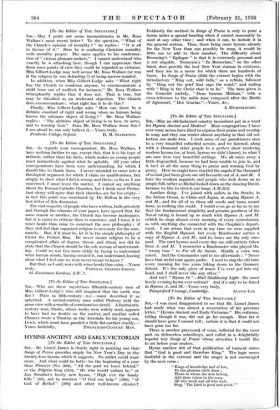HYMNS ANCIENT AND EARLY-VICTORIAN
[To the Editor. of THE SPECTATOR." SIR,—Mr. Lionel James is clearly right in pointing out that,/ Songs of Praise provides amply for New Year's Day in _the-1 twenty-four hymns which it suggests. No addict could want more. And what could be better for the beginning of a year- than Pioneers (No. 804), " All the past we leave behind," or the Pilgrim. Song (515), " He who would. valiant be," or Jan Struther's lovely new hymn, " High o'er the lonely hills " (68), not to mention " 0 God our help " (598), " God of Bethel " (590) and other well-known classics ?
Evidently the method in Songs of Praise is only to print a hymn under a special heading when it cannot re,asonably ' be used at any other time ; and when it can, to include it in the general section. Thus, there being more hymns already for the New Year than can possibly be sung, it would be little use to add to their number. The difficulty about Browning's "Epilogue " is that it is extremely personal and is not singable. Tennyson's " In Memoriam," on the other hand, does provide the best New Year stanzas in existence,
and they are in a metre for which there are hundreds of tunes. In Songs of Praise (633) the extract begins with the
introductory " Ring out, wild bells," as a refrain; followed by " Ring out the grief that saps the mind," and ending with " Ring in the Christ that is to be." The tune given is the Grenoble melody, " Deus tuortun Militum," with a cross-reference to the noble tune composed after the Battle of Agincourt, " Deo Gracias."—Yours, &c., A thammomsr.














































 Previous page
Previous page